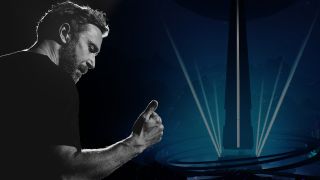Can VR concerts save a music industry brought to its knees by Covid-19?
See your favorite DJ play virtually in an alien world

Ever wanted to travel to an alien world on a virtual spaceship to see David Guetta’s avatar DJ-ing your own personal concert? Well, now you can, thanks to a new VR experience called Sensorium Galaxy, a multi-user social virtual reality platform where users are transported to virtual alien ‘worlds’ to watch their favorite DJs in concert.
Available on “the most popular VR headset brands and PC”, Sensorium Galaxy isn’t just about seeing DJs at the decks – according to the company, it’s an evolution of social networking, letting users “immerse themselves in exciting new worlds to get together with their loved ones, meet new people, and take part in unique virtual activities”.
- The best VR headsets you can buy today
- Check out the best VR games, too
- Read our HTC Vive review
These worlds come with “supernatural features,” as Sasha Tityanko, Sensorium’s deputy CEO (Art & Marketing) explains. One such world, called Prism, is “a remote planet filled with black rock, lakes, and oceans,” where “everything transforms and evolves, under the influence of music that the artist plays while they’re giving a performance”.
Prism was created alongside Yann Pissenem, CEO and founder of The Night League and one of the leading figures in the Ibiza dance scene – and it’s in this virtual world that you’ll find Guetta behind the decks.
In a video premiere exclusive to TechRadar, you can see Guetta in action as he’s transformed into a virtual avatar, in what he describes as “a next-level experience”:
All aboard the virtual starship
So how does it work? Ivan Nikitin, Sensorium’s Head of Product, explains: “If you're a VR user, you put on the HMD (head-mounted display) and you enter the virtual world. The first location is aboard your personal cabin, which we call starships. It's a general lobby area for users to gather together and meet new people, meet with friends, and from there, to go to all the different worlds.”
Of course, you may not have a host of friends with access to VR headsets, ready to join you in your adventures – but Sensorium has thought of that.
Get daily insight, inspiration and deals in your inbox
Get the hottest deals available in your inbox plus news, reviews, opinion, analysis and more from the TechRadar team.
“You're immediately greeted by a computer-controlled character, kind of a virtual being, which is driven by a combination of genetic algorithm, and reinforcement learning”, says Nikitin. In other words, these characters learn from their interactions with real users, in theory, becoming smarter as time goes on.
“They're able to support a natural, flowing conversation with the user, so those virtual beings become your companions in your virtual travels across the Sensorium Galaxy. The way we see the ultimate goal of artificial intelligence is that as you keep sharing the experiences and information with those beings, and at some point they will know enough about you to be able to match you with like minded users,” he explains.
It may sound far-fetched, but Sensorium Galaxy has attracted a host of well-known DJs who want to bring their music to the virtual masses – and it could be the boon that a music industry brought to its knees by Covid-19 needs right now.

No limitations
Live music is just one of the industries that has suffered as a result of the Covid-19 pandemic over the last year, with festivals, tours, and gigs cancelled across the world.
Just as workplaces have looked to the likes of Zoom and Microsoft Teams to bring face to face meetings online, the music industry is looking at ways it can continue to bring the live music experience to fans from the comfort of their own homes – and the answer might lie in virtual reality.
The goal isn’t to exactly replicate the experience of a live music concert, as Yann Pissenem tells us. For example, in VR you may be able to fly, dance in between your favorite band members, and even “see the audience from the eyes of the DJ”.
“You can be dressed as you want, you can be as tall or as big as you want – and you can act in a different way to how you would normally”, he explains excitedly. “There are no limitations.”
There are obvious benefits to using virtual reality for live music performances, not least the ability to experience them in a way that would not be possible in real life. Virtual concerts are accessible from anywhere, at any time, so you don’t have to wait years for your favorite artists to tour in your country.
Virtual reality is only now approaching mainstream adoption in a meaningful way. Right now, there are just four main players when it comes to mainstream VR headsets you can use at home, including Oculus, PlayStation, HTC, and Valve – and these headsets don’t exactly come cheap.
But, VR is a technology that’s on the rise, both in terms of its prominence and its capabilities – and what was once a sci-fi pipe dream is well on its way to becoming a full-blown cultural phenomenon, and a new way for us to experience art, meet new friends, and play games.
It may not end up being the savior of the live music industry, and we daresay music lovers will be heading back to stadiums, concert halls, pubs, and clubs as soon as restrictions are lifted – but there’s no doubt that VR experiences like Sensorium Galaxy offer an exciting new perspective for music fans, artists, and the wider industry.
- Music fan? These are the best headphones you can buy
Olivia was previously TechRadar's Senior Editor - Home Entertainment, covering everything from headphones to TVs. Based in London, she's a popular music graduate who worked in the music industry before finding her calling in journalism. She's previously been interviewed on BBC Radio 5 Live on the subject of multi-room audio, chaired panel discussions on diversity in music festival lineups, and her bylines include T3, Stereoboard, What to Watch, Top Ten Reviews, Creative Bloq, and Croco Magazine. Olivia now has a career in PR.

